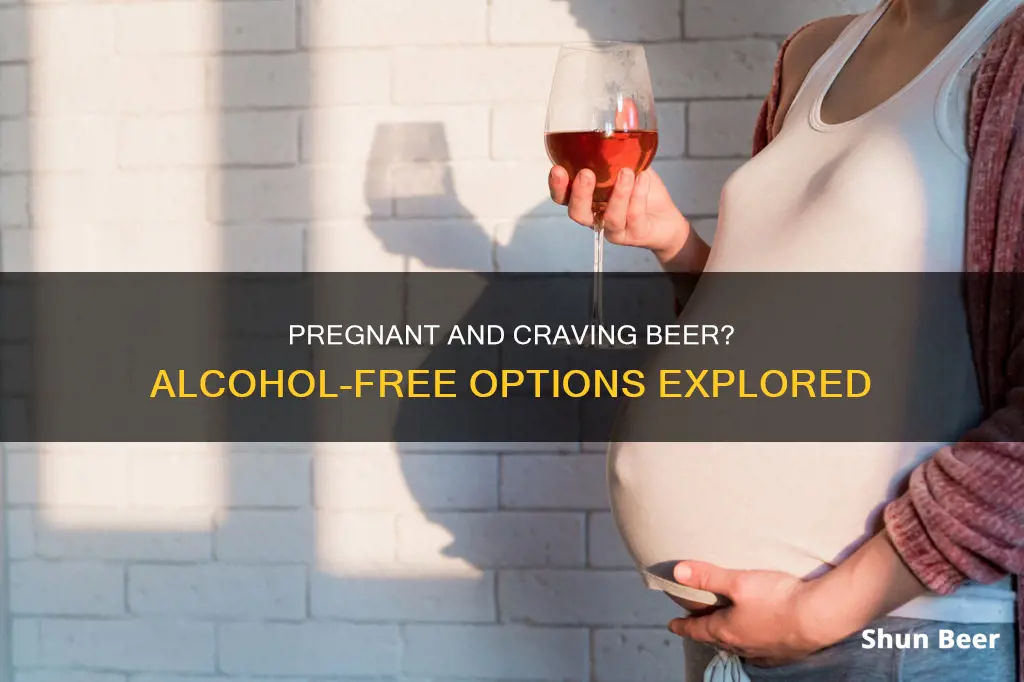
Alcohol-free beer is a tempting option for those who are pregnant and craving a drink, but is it safe? The answer is not entirely clear. While some sources claim that non-alcoholic beer can sometimes contain more alcohol than stated on the label, others maintain that these drinks are safe for pregnant women as they contain little to no alcohol. However, official guidelines suggest that no amount of alcohol is considered safe during pregnancy.
| Characteristics | Values |
|---|---|
| Is it okay to drink alcohol-free beer when pregnant? | No, it is not considered safe to drink alcohol-free beer during pregnancy. |
| Why? | Alcohol-free beer may contain trace amounts of alcohol (up to 0.5% ABV), and there is no known safe level of alcohol intake during pregnancy. |
| What are the risks of drinking alcohol during pregnancy? | It can cause Fetal Alcohol Spectrum Disorders, including Fetal Alcohol Syndrome, which can lead to physical, cognitive, and behavioural complications in the baby. |
| Are there any alternatives to alcohol-free beer during pregnancy? | Yes, there are non-alcoholic mocktails, soft drinks, milkshakes, and non-alcoholic versions of wine and cordials. |
| What if I drank alcohol before knowing I was pregnant? | It is recommended to stop drinking alcohol as soon as you find out you are pregnant. The effects of small amounts of alcohol consumed before knowing may be corrected by the healthy cells that develop later in the pregnancy. |
What You'll Learn
- Alcohol-free drinks may still contain alcohol
- Non-alcoholic drinks may contain higher ethanol levels than advertised
- Drinking alcohol while pregnant can cause fetal alcohol spectrum disorders
- No amount of alcohol is considered safe during pregnancy
- Non-alcoholic drinks may contain extracts, herbs, or other ingredients that are unsafe for pregnant people

Alcohol-free drinks may still contain alcohol
It is important to note that the terms "non-alcoholic" and "alcohol-free" are not considered synonymous by the Food and Drug Administration (FDA). "Non-alcoholic" drinks, such as non-alcoholic beer, wine, and cocktails, can contain up to 0.5% alcohol by volume (ABV) and are still legally considered non-alcoholic despite containing trace amounts of alcohol. On the other hand, "alcohol-free" drinks have zero detectable alcohol and are generally made with fruit juice or soda water to mimic the flavor profiles of alcoholic drinks.
However, it is crucial to understand that even these trace amounts of alcohol in "non-alcoholic" drinks can be risky during pregnancy. The American College of Obstetrics and Gynecology (ACOG), the Centers for Disease Control and Prevention (CDC), and the American Academy of Pediatrics (AAP) agree that no alcohol should be consumed during pregnancy, including "non-alcoholic" drinks with 0.5% alcohol or less. This recommendation is based on the fact that there is no known safe level of alcohol intake during pregnancy, and any alcohol consumption can lead to fetal alcohol spectrum disorders, including physical, cognitive, and behavioral complications in the developing fetus.
Furthermore, studies have shown that "non-alcoholic" drinks may contain higher levels of ethanol than indicated on their labels. A 2010 study analyzed 45 beverages claiming to have no or low alcohol content and found that 29% of them had ethanol levels higher than declared, with some even reaching up to 1.8% ABV. This discrepancy between the label and actual alcohol content underscores the uncertainty and potential risk associated with consuming "non-alcoholic" drinks during pregnancy.
Therefore, it is recommended that pregnant individuals abstain from consuming "non-alcoholic" drinks to eliminate any potential risk to the developing fetus. While it may be challenging to give up these drinks, it is crucial to prioritize the health and safety of the unborn child.
Drinking Non-Alcoholic Beer: Is It Safe to Drive?
You may want to see also

Non-alcoholic drinks may contain higher ethanol levels than advertised
It is important to note that even small amounts of alcohol can have harmful effects on fetal development. Alcohol consumption during pregnancy can cause physical, cognitive, and behavioural complications, referred to as fetal alcohol spectrum disorder (FASD). FASD includes dysmorphic facial features, growth retardation, and serious neurodevelopmental disorders.
To eliminate any risk of FASD, complete abstinence from alcohol, including non-alcoholic beverages, is recommended during pregnancy. This is because there is currently no known safe threshold for alcohol intake during pregnancy.
When consuming non-alcoholic drinks, it is always a good idea to read the labels carefully and check the ABV percentage. Additionally, consulting with a healthcare provider before consuming any new drink during pregnancy is advisable.
Beer Drinking: A Firm No!
You may want to see also

Drinking alcohol while pregnant can cause fetal alcohol spectrum disorders
Drinking alcohol during pregnancy can cause fetal alcohol spectrum disorders (FASDs). FASDs refer to a range of physical, cognitive, and behavioral abnormalities in a child caused by exposure to alcohol in the womb. This exposure can interfere with the baby's brain development and other critical organs, leading to lifelong deficits and problems.
Fetal Alcohol Syndrome (FAS) is the most severe form of FASD and includes dysmorphic facial features, growth retardation, and serious neurodevelopmental disorders. However, even lesser amounts of alcohol can cause harm, and there is no known safe amount of alcohol consumption during pregnancy. Alcohol can kill cells in different parts of the fetus, disrupt nerve cell development, constrict blood vessels, and produce toxic byproducts that can damage the baby's brain cells.
The effects of alcohol consumption during pregnancy can result in a range of issues for the child, including abnormal facial features, shorter-than-average height, hyperactive behavior, attention and memory difficulties, learning disabilities, speech and language delays, intellectual disabilities, poor reasoning and judgment skills, sleep and sucking problems, vision or hearing problems, and problems with the heart, kidneys, or bones.
To prevent FASDs, it is recommended that pregnant people abstain from consuming any alcohol, including non-alcoholic beverages, as these may contain higher levels of ethanol than indicated on the label. While the effects of alcohol consumption during breastfeeding are less certain, it is generally recommended to briefly delay breastfeeding after consuming alcohol to ensure the infant is not exposed.
Post-C-Section: Beer Drinking, What You Need to Know
You may want to see also

No amount of alcohol is considered safe during pregnancy
While non-alcoholic drinks are generally considered safe for pregnant women, it's important to note that the term "non-alcoholic" is legally defined as containing less than 0.5% alcohol by volume (ABV). This means that these drinks can still have trace amounts of alcohol, and the effects of such small amounts on fetal development are not well understood.
The American College of Obstetrics and Gynecology (ACOG) and other medical organizations, such as the Centers for Disease Control and Prevention (CDC) and the American Academy of Pediatrics (AAP), recommend that pregnant women completely abstain from consuming alcohol. This is because there is no known safe level of alcohol intake during pregnancy, and even small amounts can potentially cause harm to the fetus.
Fetal Alcohol Spectrum Disorder (FASD) is a range of physical, cognitive, and behavioral complications that can occur in neonates exposed to alcohol in utero. The most severe form of FASD is Fetal Alcohol Syndrome (FAS), which can cause facial abnormalities, growth retardation, and serious neurodevelopmental disorders. FAS is completely preventable if the mother abstains from alcohol during pregnancy.
While some studies suggest that light drinking during early pregnancy may not have negative effects, there are no clear guidelines on how much alcohol is safe. The line between "light" and "moderate" drinking is vague, and the effects of alcohol on the fetus can vary depending on individual factors such as the mother's body fat and the medications she is taking. Therefore, to eliminate any risk of FASD, it is recommended that pregnant women abstain from consuming any alcohol, including non-alcoholic beverages that may contain trace amounts.
Pregnant women who crave the taste of alcohol can opt for alcohol-free mocktails or drinks labeled "alcohol-free," which by law must contain no traceable alcohol. However, it is always advisable to check the labels and consult with a healthcare provider before consuming any new drink during pregnancy.
Beer and Wine: Friend or Foe on a Low-Fiber Diet?
You may want to see also

Non-alcoholic drinks may contain extracts, herbs, or other ingredients that are unsafe for pregnant people
While non-alcoholic drinks are generally considered a safer alternative to regular alcoholic beverages, it is important to note that they may still contain small amounts of alcohol. This is because the terms "non-alcoholic" and "alcohol-free" are not synonymous. "Non-alcoholic" drinks can contain up to 0.5% alcohol by volume (ABV), while "alcohol-free" drinks have zero detectable alcohol.
However, the presence of alcohol may not be the only concern when it comes to non-alcoholic drinks during pregnancy. Some of these drinks may contain extracts, herbs, or other ingredients that are not safe for pregnant individuals. For example, the popular non-alcoholic beverage Jas Paloma Libre contains ashwagandha, also known as Indian ginseng, which is advised against for pregnant and breastfeeding individuals. Additionally, brands like Kin Euphorics and Recess state that their beverages should not be consumed by pregnant and breastfeeding individuals.
The effects of consuming these ingredients during pregnancy are not well studied, and it is always better to be cautious when it comes to the health of both the mother and the developing fetus. It is important to carefully read the labels of non-alcoholic drinks and be aware of any ingredients that may be unsafe during pregnancy. If in doubt, it is best to consult with a healthcare professional before consuming any non-alcoholic drinks.
Furthermore, it is worth mentioning that the brewing process of non-alcoholic drinks can sometimes result in higher-than-expected alcohol content. A study by Motherisk analyzed 45 beverages claiming to have no or low alcohol content and found that 29% of them contained ethanol levels higher than what was declared on the label. Six beverages marketed as having 0% alcohol actually had more than 1% ethanol, with some reaching up to 1.8%. This discrepancy between the labeled and actual alcohol content can be concerning for pregnant individuals aiming to avoid any potential risks to their baby's health.
In conclusion, while non-alcoholic drinks may seem like a safer option during pregnancy, it is important to be vigilant about the ingredients they contain. The potential presence of extracts, herbs, or other unsafe ingredients underscores the importance of carefully reading labels and consulting with healthcare professionals. Additionally, the possibility of higher-than-expected alcohol content in some non-alcoholic drinks further emphasizes the need for caution. Ultimately, the health and safety of both the mother and the developing fetus should be the top priority when making decisions about consuming non-alcoholic drinks during pregnancy.
Beer Overload: The UTI Connection
You may want to see also
Frequently asked questions
There is no known safe level of alcohol intake during pregnancy, so it is recommended that pregnant people abstain from drinking alcohol. Alcohol-free beer can contain up to 0.5% alcohol by volume, and some brands may contain even higher levels of alcohol than advertised. Therefore, it is advisable to check the label and consult with a healthcare provider before consuming alcohol-free beer during pregnancy.
Drinking alcohol during pregnancy can lead to Fetal Alcohol Spectrum Disorders (FASD), which include physical, cognitive, and behavioural complications. FASD can cause facial abnormalities, growth retardation, serious neurodevelopmental disorders, and other birth defects.
Yes, there are several alternatives to alcohol-free beer that pregnant people can enjoy. These include mocktails, sparkling water or tonic with ice and lemon, traditional still lemonade, and milkshakes made with skimmed or semi-skimmed milk.
It is important to note that any alcohol consumed very early in pregnancy, before 8 weeks, is likely to have minimal effect on the fetus. As soon as you find out you are pregnant and stop drinking, any potential harmful effects will likely be corrected by the healthy cells that are rapidly developing.
While there is limited research on this topic, a report found that when breastfeeding parents drank 1.5 liters of non-alcoholic beer, about 13% had trace amounts of alcohol in their breast milk afterward. However, the researchers concluded that drinking non-alcoholic beer is likely harmless to the breastfed infant. It is recommended to wait for at least two hours after drinking before breastfeeding.







